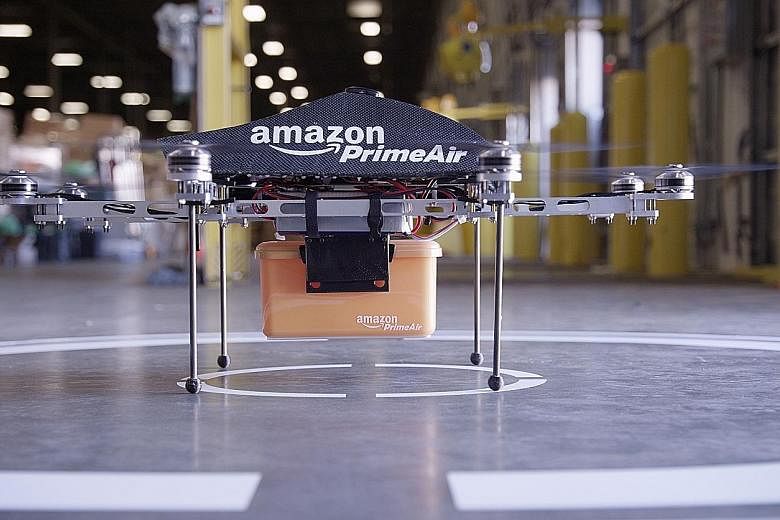Amazon.com's Jeff Bezos has made a career of being first in e-commerce. But in one critical area, he's falling behind - thanks to Washington. While Mr Bezos has been eager to deliver orders to customers in the United States with drones, Amazon's efforts have so far been stymied by outdated regulations.
Meanwhile, JD.com, an Amazon-like Chinese retailer, is soaring past its American rival. JD has already employed drones to make thousands of deliveries in China, where regulators have not been as obstructive. The start-up has received approval from five provinces so far to fly drones, and is applying for more. It recently announced plans to build 150 drone stations in south-western Sichuan province alone.
Washington should take note. President Donald Trump has been making a big deal of his intention to eliminate regulation, insisting that it stifles businesses. Looking at the case of China, he has a point. In some respects, looser oversight in China is allowing companies to experiment in ways that are more difficult for their American counterparts. And that can give Chinese competitors an edge - especially when it comes to technology companies driven by risk and innovation.
Admittedly, China is far from a regulatory paradise. In many areas, bureaucrats meddle in business to a degree unthinkable in the West, such as their strict control over capital flows. In others, regulations are opaque, confusing or selectively enforced. Once when I had to transfer my visa from an old passport to a new one, three bureaucrats sitting in front of me argued over how to do it. Imagine attempting something more complicated. The result is an often contradictory mishmash. Regulators ban shops from handing out free plastic bags to protect the environment, but then permit factories to smother their cities in toxic smog.
However, this erratic approach also presents opportunities, especially for start-ups. Take China's bike-sharing services. One of its major players, Bluegogo, was run off the streets of San Francisco after a run-in with the authorities who were worried about abandoned bikes cluttering the city. In China, the government has let the companies, and their multi-coloured bikes, run amok (at least so far). Yes, the bikes are piling up on sidewalks, but the permissive attitude has sparked the invention of an entirely new industry, with investors ploughing hundreds of millions of dollars into it.

In financial technology, too, this hands-off approach could help Chinese companies outpace their American counterparts. A January report from Citi GPS contends that one of the "magic ingredients" behind the rapid advance of China's fintech business is a "light regulatory touch". That has allowed firms such as Ant Financial to grow and diversify into a range of services at a striking speed.
American fintech companies, by contrast, face a complex web of red tape from myriad regulators, state and federal, that threatens to squelch growth and inventiveness. Although Washington has proposed streamlining the system, the attempt has been controversial and faces resistance from state agencies. The US "has long been considered the birthplace of fintech giants", argues public relations consultancy Edelman, but it could soon "fall behind other nations due to the need for our regulatory environment to evolve".
China also offers evidence of the damage caused when regulators replace that light touch with a heavy hand. When bureaucrats imposed new requirements on Didi Chuxing, China's largest ride-sharing app, limiting who was eligible to take on passengers, they caused a huge contraction in the number of Didi drivers and forced the company to restructure its operating model earlier this year.
In other areas, regulators have allowed businesses to expand in new ways until the downside became downright dangerous. It's a hard balance to strike. But China's hands-off approach, whether intentional or not, has created an environment in which start-ups can experiment with trial-and-error, take on increased risk - and thrive.
The US should be paying attention.
BLOOMBERG VIEW
- The writer is a journalist based in Beijing and author of Confucius: And The World He Created.

